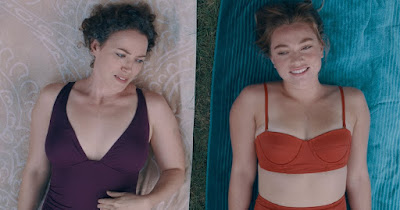Thoughts on a film: Creep (2014)
While some of these commentators may have a point regarding the first two complaints (which I'll circumnavigate back to shortly), the third and less specific criticism of "not scary" is, at the very least, a subjective response. Like "not funny", or "not conventionally beautiful", it's a statement that says more about the individual viewer than it does about the film itself (although this is true of all criticism in general). It speaks of a certain expectation that is often forced upon an audience by ways of marketing (how the film is sold, in terms of its specific genre, title or imagery) and not of what the filmmakers were attempting to achieve on their own terms.
While practically speaking, Creep is a kind of horror film - in the sense that it works within the recognizable parameters of the genre, employing many of the same tropes and conventions that are familiar from other works operating along similar means - the intention isn't always to frighten or to scare the audience, but something else.
Instead, what the film appears to be doing is creating a series of situations that work to manipulate and provoke the viewer into reaching a particular emotional response. In this sense, the construction of the film and its relationship to the viewing audience mirrors the relationship between the two central characters; struggling videographer Aaron (played by the film's director, Patrick Brice) and the eccentric middle-aged rich-kid Joseph (played by the film's co-producer, Mark Duplass).
Joseph, who claims to have a terminal illness, hires Aaron to produce a 'day in the life' style video-diary to be shown to his as yet-unborn son: citing the plotline from the Bruce Joel Rubin film My Life (1993) as a more wholesome example. But the relationship between the two men quickly turns sour as Joseph's behavior becomes increasingly erratic.
It is within this context that the supposed implausibility or predictability of the relationship between these characters and the eventual outcome of events seems less bothersome.
From the outset, Aaron is manipulated and misled into meeting and then spending time with his antagonist, only to then be set a series of personal provocations that should compel him to retreat to the nearest exit. Instead, the erratic behavior of Joseph simply works to further pique the curiosity of Aaron, as well as his inherent (and in this instance misplaced) sensitivity. There may even be a familiar comment about the nature of voyeurism that runs throughout many films operating within the found-footage sub-genre, such as Paranormal Activity (2007) or REC 3: Genesis (2012) – where the post-millennium cultural obsession with documenting all aspects of one's life, including death, prevail above common sense – as Arron finds himself unable to stop documenting a situation that will undoubtedly lead him into harm.
Like the tradition of comedy characters like Alan Partridge or David Brent, the presentation of Joseph reveals something cruel and mean-spirited (and again, largely voyeuristic) about his audience; it gives him, as a character, a kind of credence to turn that negativity against us, as he does with Aaron. This was significant for me because it actually contextualizes and defends against the popular criticism that the film is unconvincing in its construction and that the characters behave implausibly or in a way that defies all reasonable logic. I mean, they do, without question; but that almost seems like the point.
Personally, I found Creep to be more unsettling than outright scary, but it certainly worked at creating and sustaining a mood that was both disturbing and charged with a pervasive, underlying tension. The jump scares, which are used frequently, are also quite often delivered in a manner that's self-aware and somewhat tongue-in-cheek. The intensity and suspense that we might normally expect from a conventional horror film is similarly neutralized by the distance that the found-footage format brings to the material but is also deconstructed or reinvented by the use of the format, its "meta" elements and self-reflexivity.




























































